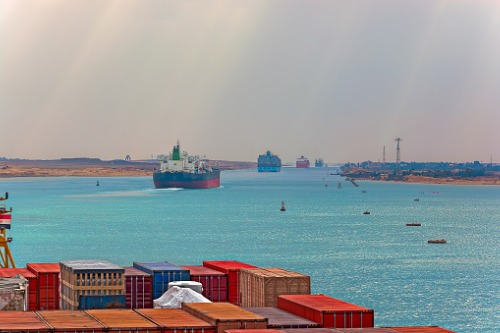

Transport and logistics insurance company TT Club is warning of continuing supply chain risks arising from the recent blockage of the Suez Canal.
Around 30% of the world’s container cargo passes through the Suez Canal each year. The canal was blocked for nearly a week last month when the container ship Ever Given ran aground. The blockage delayed about 300 ships, and many others were rerouted to the longer passage around South Africa’s Cape of Good Hope.
Mike Yarwood, TT Club managing director for loss prevention, said the industry was still feeling the effects even though the blockage has been cleared.
“Beyond the delay to cargo on board those ships affected, there will inevitably be a knock-on impact for those involved in discharging the containers at destination ports when they finally arrive, as well as the final-mile delivery carriers,” Yarwood said. “While the immediate impact may be a lack of cargo arriving when expected, presenting market supply challenges, it is when the cargo does start to turn up that further potential risks emerge.”
The arrival of large volumes of full containers, along with the requirements for hinterland distribution, will create disruptions at ports and terminals, straining yard capacities and creating an accumulation of cargo, TT Club said.
The risk won’t just affect destination hubs. It will also aggravate an already existing imbalance of container equipment, especially on east-to-west trade routes, as laden containers are tied up and consequently unavailable.
“The risk of theft at ports and freight depots in this scenario is heightened, and a greater focus on security is required,” Yarwood said. “Whether it simply be at an overspill holding or storage area, or temporary warehousing, wherever and whenever cargo is not moving, it is more likely to be stolen. Those in the supply chain should be mindful of these security risks. Due diligence, undertaken to ensure that any third-party provider of storage is adequately resourced to meet these demands, is a prudent step to take in these circumstances.”
Especially in Europe, driver shortages are already expected to spike through the year. This will exacerbate difficulties in delivering import cargo and picking up consignments for export, TT Club said.
“The last decade has witnessed many in the supply chain drive towards streamlining and operational efficiencies,” Yarwood said. “Such measures have included reducing the number of suppliers and introducing ‘just in time’ principles to lessen the burden of unnecessary inventory costs. Experiences over the last 12 months through the pandemic, the Brexit transition, and more recently, the Suez Canal blockage, bring into question this bias toward efficiency and cost reduction. If such are achieved at the cost of resilience, is this policy the correct one? The new normal might see many stakeholders increase their focus on contingencies and adopt more a ‘just in case’ philosophy than a ‘just in time’ one.”
